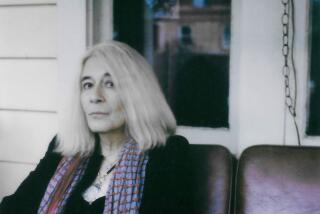De Beauvoir, Writer and Feminist, Dies
- Share via
PARIS — Simone de Beauvoir, the renowned French writer who regarded herself more as a Marxist than a feminist when she wrote what became a primer of women’s liberation, “The Second Sex,” more than 35 years ago, died Monday at a Paris hospital. She was 78.
No cause of death was given by Cochin Hospital, but De Beauvoir reportedly had been suffering from circulation problems.
De Beauvoir, who fashioned an impressive literary career as a novelist, philosopher, essayist and writer of memoirs, was a companion of Jean-Paul Sartre, the late French philosopher, playwright and novelist, for more than a half-century.
She and Sartre set the literary and political style for young French intellectuals after World War II. Although the two never married, always lived in separate apartments or hotel rooms and often experimented with other love affairs, they tried to see each other daily from the time they met at the Sorbonne in 1929 until Sartre died in 1980.
“His death does separate us. My death will not bring us together again. That is how things are,” wrote De Beauvoir, an atheist all her adult life, in a memoir about Sartre’s last days.
Although Sartre, who refused to accept the Nobel Prize in Literature in 1964, may have been better known than his companion in the world’s literary and intellectual circles, De Beauvoir may have had more readers with “The Second Sex.” The work, hailed as a landmark examination of the position of women in a male-dominated world, sold more than 1 million copies in paperback in the United States alone.
Prix Goncourt Winner
Nor did De Beauvoir lack recognition. Her novel “The Mandarins”--a tale of a French writer and her relationship with a male American counterpart--won the Prix Goncourt, France’s most coveted literary award, in 1954.
Although “The Second Sex” was often regarded as an inspiration to women’s liberation movements, De Beauvoir did not join the French feminist movement until 20 years after her book was published in 1949.
“I said I wasn’t a feminist,” she recalled later, “because I thought that the solution to women’s problems must depend on the socialist evolution of society.”
But she changed her mind two decades later.
Feminists’ Reaction
“I realized that in the past 20 years, the position of women in France had not really changed and that socialism, as it has evolved--for example, in Russia--hasn’t changed women’s position, either,” she said.
Her death brought a flurry of reaction from feminists around the world.
Typical was that of Gloria Steinem, who said in a statement:
“It’s hard to believe that somehow there’s a world without her. More than any other single human being, she’s responsible for the current international women’s movement. Her life was as pioneering as her work. Internationally and personally, she gave women the courage to strive for freedom in work and life.”
American writer Susan Sontag said: “I admired her enormously. I honored her for many things, especially ‘The Second Sex,’ which was a great event in the history of consciousness and a liberating book for all women.”
Leadership of Struggle
French Culture Minister Francois Leotard said of De Beauvoir: “Detesting accepted ideas and conformity, she put everything into her work, into her ideas--a struggle she led with her companion Jean-Paul Sartre.”
To liberate themselves, De Beauvoir urged women to have a profession and, if possible, to refuse marriage. She looked on marriage as an obscene, bourgeois institution that put women in an inferior position.
“After all,” she said, “I could have married Sartre. But I believe that we were wise not to have done so.”
With Sartre, De Beauvoir said, the problem of male oppression never came up. “Sartre is in no way an oppressor,” she said. “If I had loved someone other than Sartre, I still would not have allowed myself to be oppressed.”
For De Beauvoir, a refusal to marry meant a refusal to have children as well.
“I’ve escaped most of women’s bondages: maternity, the life of a housewife,” she once said. But the lack of children provoked criticism of her as an intellectual philosopher who did not completely understand the role of women.
In the postwar years, Sartre regarded himself as an activist in leftist causes, and De Beauvoir was usually at his side, often risking arrest, in anti-government demonstrations put down by the police.
Born in Paris on Jan. 9, 1908, Simone Lucie Ernestine Marie Bertrand de Beauvoir was the elder daughter of a middle-class lawyer who prided himself on his atheism. Her mother, however, was a devout Roman Catholic who insisted that her two daughters receive a convent education.
“This conflict between them,” De Beauvoir said, “was a good thing for me, because it meant that I couldn’t fasten on to either of them and had to decide for myself.”
Loss of Faith
But she soon chose her father’s way and lost her Catholic faith at the age of 15. She studied philosophy at the Sorbonne and met Sartre and another friend, Andre Herbaud, there. Herbaud gave her the nickname Castor, the French word for beaver.
“You are a beaver,” Herbaud said. “Beavers like company, and they have a constructive bent.” That was the nickname by which Sartre knew her all the rest of his life.
In 1929, she was named a professor of philosophy at a college in Marseilles. She later taught in Rouen and Paris before turning to literature. She wrote her first novel in 1943. By the time “The Second Sex” was published six years later, she had written two novels, a play, and two books of essays.
De Beauvoir said she wrote “The Second Sex” because she wanted to write about herself and knew she could not until she discovered first what it was like to be a woman.
After her best-selling success, she continued to write novels, a study of aging, and four volumes of autobiography, including her last work--”Adieux. A Farewell to Sartre”--published in 1981.
Her works even included a highly detailed, 200,000-word description of “The Long March” by Mao Tse-tung.
Documentary of Life
In 1979 her life became the subject of a widely praised film documentary.
Sartre and De Beauvoir presided over a youth and intellectual movement in the 1950s and 1960s that rooted itself in the old St. Germain des Pres district on the Left Bank in Paris. Followers called it the “existentialist movement” and insisted it was patterned after the philosophy of Sartre.
Existentialism holds that humans are not part of an ordered metaphysical system but that individuals are entirely free and responsible for what they make of themselves.
De Beauvoir, as the most celebrated French women writer of her time, had an enormous influence on young women attracted to the new intellectual fashion.
In a recent book about postwar life on the Left Bank, British authors Paul Webster and Nicholas Powell wrote that De Beauvoir “had an incalculable effect on the moral values of adolescent, middle-class French girls whose upbringing amounted to little more than a series of prohibitions.”
More to Read
Sign up for our Book Club newsletter
Get the latest news, events and more from the Los Angeles Times Book Club, and help us get L.A. reading and talking.
You may occasionally receive promotional content from the Los Angeles Times.










